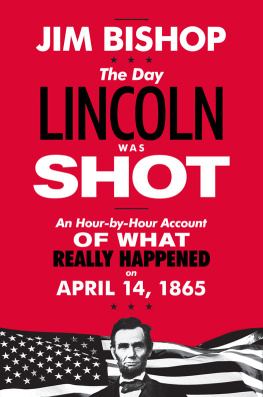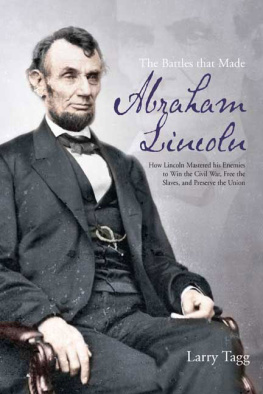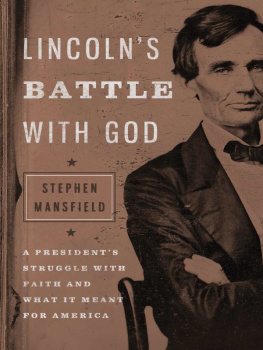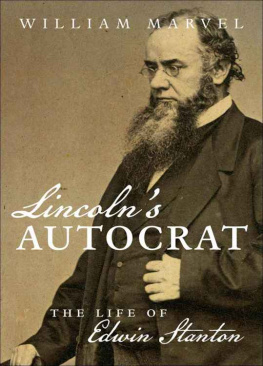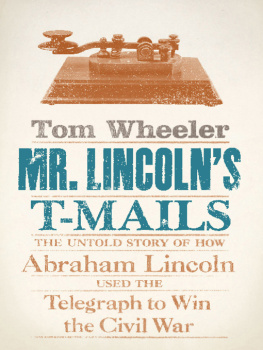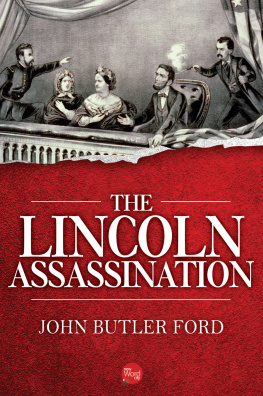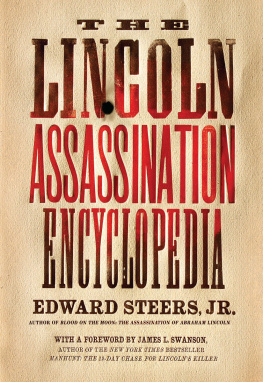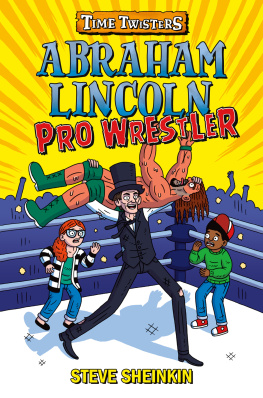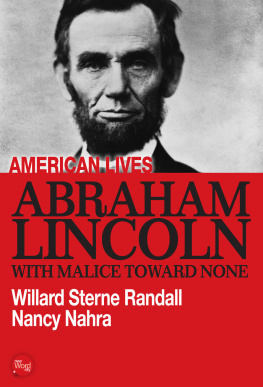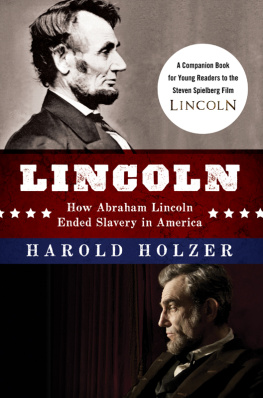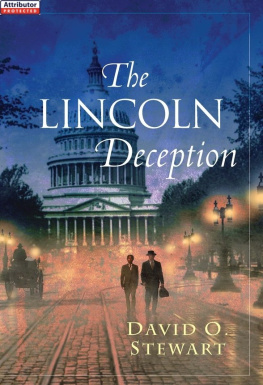Lincoln Abraham - The Impeachment of Abraham Lincoln
Here you can read online Lincoln Abraham - The Impeachment of Abraham Lincoln full text of the book (entire story) in english for free. Download pdf and epub, get meaning, cover and reviews about this ebook. City: New York, year: 2012, publisher: Alfred A. Knopf, genre: Detective and thriller. Description of the work, (preface) as well as reviews are available. Best literature library LitArk.com created for fans of good reading and offers a wide selection of genres:
Romance novel
Science fiction
Adventure
Detective
Science
History
Home and family
Prose
Art
Politics
Computer
Non-fiction
Religion
Business
Children
Humor
Choose a favorite category and find really read worthwhile books. Enjoy immersion in the world of imagination, feel the emotions of the characters or learn something new for yourself, make an fascinating discovery.
- Book:The Impeachment of Abraham Lincoln
- Author:
- Publisher:Alfred A. Knopf
- Genre:
- Year:2012
- City:New York
- Rating:5 / 5
- Favourites:Add to favourites
- Your mark:
- 100
- 1
- 2
- 3
- 4
- 5
The Impeachment of Abraham Lincoln: summary, description and annotation
We offer to read an annotation, description, summary or preface (depends on what the author of the book "The Impeachment of Abraham Lincoln" wrote himself). If you haven't found the necessary information about the book — write in the comments, we will try to find it.
The Impeachment of Abraham Lincoln — read online for free the complete book (whole text) full work
Below is the text of the book, divided by pages. System saving the place of the last page read, allows you to conveniently read the book "The Impeachment of Abraham Lincoln" online for free, without having to search again every time where you left off. Put a bookmark, and you can go to the page where you finished reading at any time.
Font size:
Interval:
Bookmark:

THIS IS A BORZOI BOOK
PUBLISHED BY ALFRED A. KNOPF
Copyright 2012 by Stephen L. Carter
All rights reserved. Published in the United States by Alfred A. Knopf, a division of Random House, Inc., New York, and in Canada by Random House of Canada Limited, Toronto.
www.aaknopf.com
Knopf, Borzoi Books, and the colophon are registered trademarks of Random House, Inc.
Library of Congress Cataloging-in-Publication Data
Carter, Stephen L., [date]
The impeachment of Abraham Lincoln / by Stephen L. Carter 1st ed.
p. cm.
This is a Borzoi book.
eISBN: 978-0-307-95840-2
1. Lincoln, Abraham, 18091865Fiction. I. Title.
PS 3603.A78I47 2012
813.6dc23 2012005890
This is a work of fiction. Names, characters, places, and incidents either are the product of the authors imagination or are used fictitiously. Any resemblance to actual persons, living or dead, events, or locales is entirely coincidental.
Jacket design by Kelly + Cardon Webb
v3.1
for Antoinette WrightContents
This is a work of fiction. I have played games with far more history than even the title suggests; and yet many parts of the story are truer to the historical narrative than, at first blush, the reader might suppose. A compendium of my changes may be found in the authors note at the end of the book .
S.L.C .
I conceive that I may in an emergency do things on military grounds which cannot be done constitutionally by Congress. Abraham Lincoln, July 4, 1864, as recorded in the diary of his secretary, John HayMr. Lincoln has four long years of strife before him; and as he seems little inclined to change his advisers, his course of action, or his generals, we do not believe that the termination of his second period of government will find him President of the United States. London Gazette, commenting on Lincolns re-election in 1864
Prologue
April 1416, 1865
TURMOIL .
The President was dying.
As the grim news spread through Washington City, angry crowds spilled into the cold, muddy night. Abraham Lincoln had been shot at Fords Theatre, on Tenth Street. The wounds were mortal, people were saying. There was no way he could survive. The war was over, the South utterly vanquished, yet somehow its withered hand had reached up into the nations capital and extracted this bitter revenge. The crowds became mobs, looking for somebody to hang. Some wanted to burn Fords to the ground. Others marched toward Old Capitol Prison, where many leaders of the late rebellion were still being held. Rumors passed from mouth to mouth: The Vice-President had been murdered in his rooms at Kirkwood House. The Secretary of State had been stabbed to death in his mansion on Lafayette Square. Confederate troops were advancing on the city. Or Union troops: nobody seemed to know for sure, and a coup dtat had been rumored for years. Outside Fords Theatre, a man in the blood-spattered uniform of an army major and a doctor carrying a candle fought their way into the street. A group bearing Lincolns unmoving body followed behind. Mrs. Lincoln, face like chalk, clutched her husbands stiff hand. People leaned in, trying to see or touch. Men groaned. Women wept. A soldier banged on the door of a row house across the way. They carried the President inside and shut the door. People craned to peer in the windows. Minutes later, Secretary of War Stanton, the most feared man in Washington, arrived in an unguarded carriage and raced inside. Other officials followed. Furious soldiers took up positions on the sidewalk but seemed to have no clear orders. They battered members of the crowd for practice. Other men went in. The people who had been closest to the body passed on the story: the Presidents head was a mass of blood.
Meanwhile, the hue and cry had been raised. That actor fellow. Wilkes Booth. He had shot the President and leaped to the stage, then escaped on horseback. Somehow the mob was armed now, looking for someone to whom they might do mayhem. Booth would be best, but any Southern sympathizer or paroled Confederate soldier would do, or, in the absence of so obvious a target, any man dressed in gray, or a Catholic, or a darkie. In the confusion, Stanton took command. He ordered the city sealed. Trains were stopped. Guards allowed no one across the bridges. Telegrams were sent to military commanders in Virginia and Maryland, warning them to watch for men on horses fleeing Washington. On the Potomac River, a steamer was prepared as a floating prison should any of the conspirators be apprehended, the better to protect them from the mob: good order required that they be hanged swiftly by soldiers rather than by citizens.
The Union had been struck a hard blow, and wanted revenge.
From Philadelphia to New York to Chicago, newspapers were out with special late editions, their entire front pages devoted to the shooting. Some headlines pronounced the President already dead. Editors who had been Lincolns sworn foes eulogized him as the nations savior; others, who had openly despised Mrs. Lincoln, assured the nation that they stood beside the First Lady in her impending widowhood. In the war-ravaged South, where few telegraph lines were intact, the news moved more slowly. Lincolns longtime bodyguard, Allan Pinkerton, was in New Orleans, and would not learn of the shooting for several days. In the cities of the North, vengeful citizens marched. Church doors were flung open so that people might pray for the Presidents recovery. But the prayers, like the mobs, seemed fruitless. Everybody knew that it was too late. Little squares of black crepe began to appear in windows, signaling a nation already mourning.
That was Friday. By Saturday, however, the rumors began to change. Perhaps all was not lost. The doctors had cleaned the wound repeatedly and removed the clotting blood. And a miracle was occurring. The Presidents indomitable will was asserting itself. He was breathing strongly on his own, his eyes were fluttering open, and the damage to his brain appeared less severe than first thought. The telegraph flashed the news across the country: Lincoln lives! True, Vice-President Andrew Johnson was dead, and the Secretary of State so badly wounded that he might not see another day, but Abraham Lincoln, savior of the nation, seemed to be improving.
He had been shot on Good Friday. On Easter Sunday, he rose.
By the middle of the week, the President was sitting up, meeting with his staff, once again in charge of the affairs of the nation. Across the country, people cheered. Those who felt otherwise kept their disappointment to themselves, content to bide their time.
November 19, 1866
The night riders were gaining.
Bending low, the black man spurred his tiring horse down the tangled leaf-strewn lane. On either side, fields thick with brightleaf tobacco stretched into the chilly Virginia darkness. Just a few miles ahead loomed the lower slopes of the Shenandoah, with its welcoming forest. If he could only reach the tree belt, he would be safe. A few miles to the north, an entire brigade of Union troops garrisoned the town of Winchester, but with three hooded pursuers only a few hundred yards behind, his chances of reaching either sanctuary were small. He had a pistol in his saddlebag and a knife in his belt, and he knew that if he slowed to draw either, the night riders would have him.
That would be bad.
In a hidden pocket sewn beneath the lining of his right boot was the message. If he was caught and searched, the night riders might find it.
That would be worse.
He rode faster. The autumn drizzle turned to steam on the horses burning flanks. He heard a low crackle that might have been distant lightning or a nearby gunshot. He rounded a bend, jumped a fallen tree, nearly spilled on the other side. Very soon his mount would collapse.
Next pageFont size:
Interval:
Bookmark:
Similar books «The Impeachment of Abraham Lincoln»
Look at similar books to The Impeachment of Abraham Lincoln. We have selected literature similar in name and meaning in the hope of providing readers with more options to find new, interesting, not yet read works.
Discussion, reviews of the book The Impeachment of Abraham Lincoln and just readers' own opinions. Leave your comments, write what you think about the work, its meaning or the main characters. Specify what exactly you liked and what you didn't like, and why you think so.


